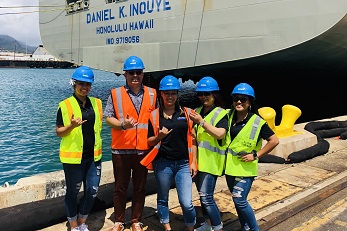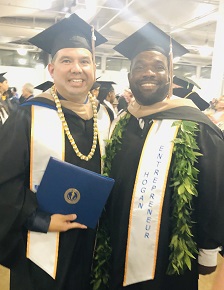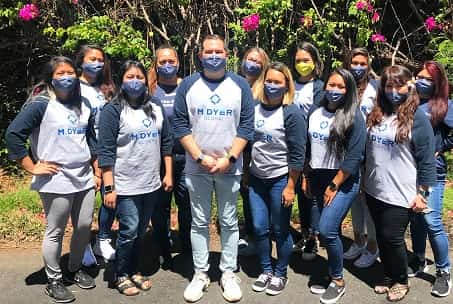Nothing can quite prepare you for the kind of unparalleled economic crisis the world saw as the coronavirus shut down so many aspects of daily life, locking down cities, shuttering stores and bringing tourism to a standstill. But there’s no doubt Anthony Shipp, MBA ‘19 was more prepared than most.

Shipp is a Marine veteran who served three combat tours in the Middle East—so he knows a little something about overcoming adversity. During the Great Recession, he was a business owner who saw revenues plummet and the economy go topsy-turvy—so he knows about the importance of preparing for a rainy day, too. And going into the pandemic, as president and CEO of M. Dyer Global, Shipp also knew he’d be relying on his decades of experience in logistics, IT and managing through crisis.
That doesn’t mean 2020 was smooth sailing for Shipp or his logistics, freight forwarding and international relocation company, by any stretch. But he’s grateful to have ended the year in a strong position, even while the industry—and many of his competitors—suffered major losses.

And he attributes his successes to understanding the importance of acting quickly, taking a few calculated risks and staying true to his servant leadership style. He also takes lifelong learning seriously and says the mentor and peer relationships he built throughout his career, including as a graduate student at Chaminade, have helped him stay on top of—or in front of—market trends.
“Nobody would have been able to predict this—everything that’s happened,” Shipp said, in a recent interview with Chaminade Magazine, adding that remaining adaptable and nimble have proven essential to surviving as the economy only now starts a slow and painstaking recovery process.
“As a business leader, you need to be prepared for change at all times.”
In fact, when the pandemic first started, Shipp turned his office into a “war room,” gathering his senior leaders to prioritize top projects and prepare for the rocky days ahead. One lesson he learned during the Great Recession, which was solidified in Chaminade’s MBA program, was a seemingly simple one: “cash is king.” So in those early days of the pandemic, he did everything he could to free up cash in his company and prepare for the worst. It was the right move, his first of many amid the crisis.
Weathering the crisis
Shipp likes to say that he’s never really taken a direct route to anything before.
Not to logistics. Not to leadership. Not even to Hawai’i.
Straight out of high school, at just 17 years old, he enrolled in the Marines and later completed his undergraduate degree in computer science at Chapman University. After leaving active duty, he worked in IT then moved to operations and eventually worked his way up to management. But he had to put his career on hold several times to serve his country. While in the reserves, he got called to active duty three times, serving two combat tours in Iraq and one in Afghanistan before leaving the service.
That was in 2006, the same year Shipp designed to open his own trucking and logistics business.
“I had big dreams and aspirations,” he said, and they were quickly tempered by the 2008 economic crash. Shipp said he nearly lost his business in the downturn, but was able to keep it afloat and then see it become profitable again as the economy improved. He ended up selling the business around 2010.
It was about that time that he took a well-deserved sabbatical to Hawai’i, getting his first taste of the islands and the aloha spirit. Two years later, he would move to the state permanently—and quickly start to learn about the unique logistical and regulatory challenges Hawai’i companies face.
He became first the chief technology officer and then the chief commercial officer at Hawai’i Transfer Company, Ltd., a family-owned transportation services business. He was also able to revolutionize their operations, bringing in new efficiencies and successfully wooing big national accounts.
Opportunity knocks
Shipp was happy where he was, but opportunity came knocking on his door. An executive search firm sought him out to see if he was interested in taking the helm at M. Dyer. It was an opportunity he couldn’t turn down. And so in August 2017, he took over as the company’s president and CEO.

About that same time, Shipp was just starting his Master of Business Administration program at Chaminade. “I was in my early 40s and I was coming into a program traditionally for students to learn and gain knowledge,” he said. “I was approaching it from a different student perspective.” And it was a perfect fit.
Shipp said Chaminade’s MBA allowed him to build on his foundation of knowledge and focus on academic areas where he wasn’t quite as strong, including finance. Shipp also found great value in the Hogan Entrepreneurial Program, hearing first-hand from Hawai’i executives about how they approach leadership, prepare for market ups and downs and set their companies up for successful futures.

“I really loved it because I got to learn from them,” he said, adding he was able to build relationships with those entrepreneurs—along with professors in the program—that remain strong today. “I captured an enormous amount of knowledge and know-how from their perspective.”
That knowledge helped guide Shipp as he took his first steps as M. Dyer’s CEO, focusing first on learning everything he could about the business he now led and reshaping its culture from one in which employees worked in silos to one in which they felt like they were part of a team.
When 2020 started, Shipp was hitting his stride and preparing to craft a strategic vision for a quickly-evolving industry. And then, seemingly overnight, everything seemed to change. Relying on his experiences, Shipp knew two things: he had to prepare for the worst—and now.
So he gathered up his senior leaders to develop key strategies for weathering the crisis.
And in the weeks and months that followed, Shipp continued to remain out in front of the markets, doing everything he could to retain customers, attract new business and steel the company for more economic pain. One project that was put on a fast track: a plan to move to paperless transactions.
Before the pandemic, the company had a two-year timeline to become paperless to improve the customer experience and streamline the company’s processes. Because of the pandemic, with in-person transactions severely limited, the project was finished in months.
In business, Shipp said, “you have to be nimble. Be prepared that things are going to happen quickly.”
‘I’m here to serve everybody’
As a leader, Shipp imagines himself at the bottom of an inverted pyramid.

It’s a servant leadership approach in which Shipp serves as a guide, a mentor, a motivator and a relationship builder. “I sit at the bottom and I’m here to serve everybody,” Shipp said, adding that in working with his leadership and broader team he hammers out a project target and a timeline and then asks, “What do you need from me? How can I support you? How can I encourage and motivate you?”
Approaching leadership this way, he says, helps bolster empowerment and accountability. Employees know they can make mistakes, as long as they learn from them, in pursuit of shared business goals. They also see themselves as subject matter experts, which means they’re more likely to bring new and innovative ideas to the table and look for efficiencies across departments and the company.
Shipp, who is a Hogan Entrepreneur, says he frequently offers three pieces of advice to the next generation of business professionals: while in school, develop lifelong mentor relationships because good counsel is never overrated; never stop learning; and know the one constant in life is change.
“You’ve definitely got to be a lifelong learner,” said Shipp. “Don’t just encapsulate what you learn at school and think that it stops there. It sets the foundation, but you should constantly have this thirst to learn.” After all, Shipp enrolled in post-graduate studies in supply chain management at MIT after graduating with his MBA from Chaminade. And in September 2020, he completed an executive education program in freight transportation and logistics from Northwestern University.
As for professional relationships, those also come in handy in hiring decisions.

Shipp said he first met his vice president of business administration, Jana Paz, when the two were in Chaminade’s MBA program. (She graduated in 2018.) Shipp likes to say the company has a “little nucleus of Chaminade alum”—plus more than a few parents who have sent their children to the university.
That’s linked to M. Dyer’s identity, Shipp said, as a local business with a global reach. Shipp said he’s sought to ensure the aloha spirit and Hawai’i’s community-oriented values are baked right into M. Dyer’s brand. “We have this element of a family within our company’s soul,” Shipp said.
As a servant leader—situated at the bottom of that inverted pyramid—Shipp doesn’t only expect his company to embody the aloha spirit. He holds himself to the same standard. “Here in Hawai’i, the bigger picture is at the community level. We have to have the highest level of integrity of trust,” he said.
And from his experience, the rest will follow.



